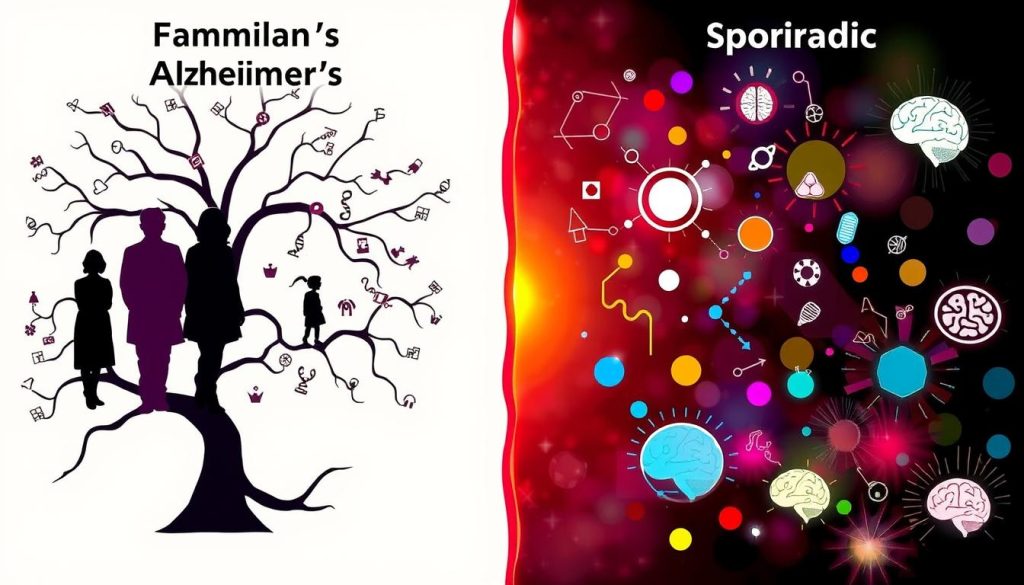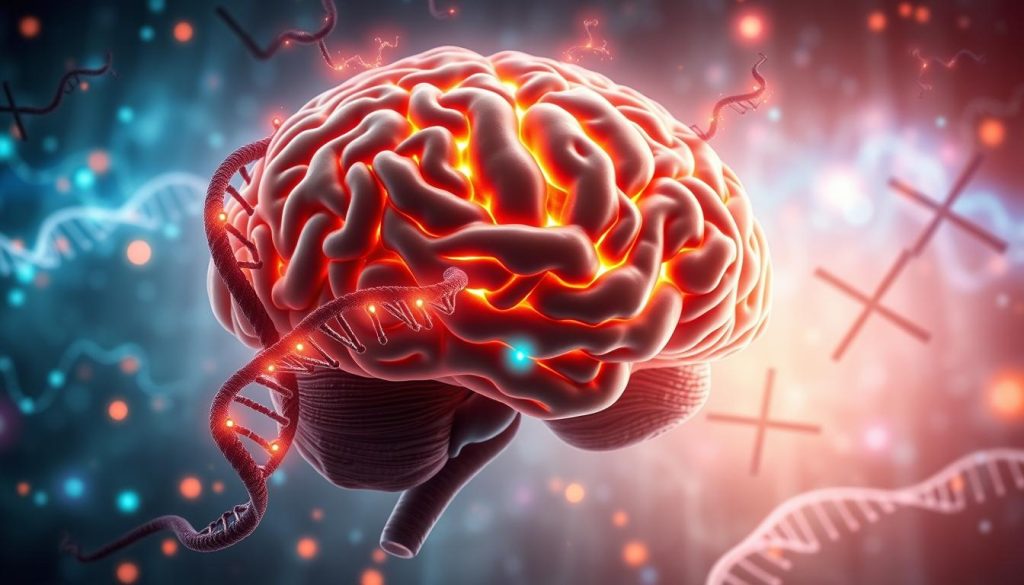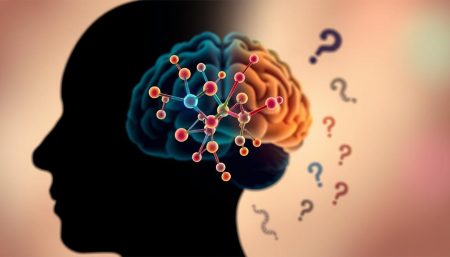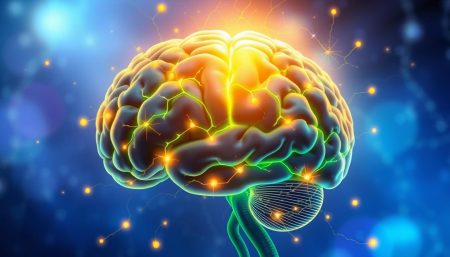Alzheimer’s disease is a complex issue in human health, causing worry in families about its hereditary link. The question “is Alzheimer’s disease hereditary?” is more than just a scientific inquiry. It’s a pressing concern for many facing the uncertainty of their genetic future.
This question goes beyond just genetics. It also looks at how lifestyle choices might affect the risk of getting familial Alzheimer’s disease. As science digs deeper into our DNA, answers to our health questions start to emerge.
When we talk about familial Alzheimer’s disease, we look at many genetic markers. These markers might influence a person’s chance of getting the disease. This mix of knowledge and empathy helps us navigate the complex genetic factors of Alzheimer’s disease. It aims to offer comfort and clarity to those affected.
Key Takeaways
- Understanding the hereditary nature of Alzheimer’s disease is vital for individuals with a family history.
- Genetic predisposition does not guarantee the development of Alzheimer’s, but it can increase risk.
- Both genetic factors and lifestyle elements contribute to the overall risk landscape for Alzheimer’s disease.
- The science behind familial Alzheimer’s disease is in constant evolution, offering hope and new insights.
- Compassionate communication about the hereditary aspects of Alzheimer’s empowers informed health decisions.
Understanding Alzheimer’s Disease and Its Impact
Alzheimer’s Disease is a term filled with fear and uncertainty. It affects many people and their families around the world. We need to learn about the causes and genetics of Alzheimer’s to clear up myths.
Defining Alzheimer’s Disease
Alzheimer’s is a brain disorder that gets worse over time. It makes memory and thinking skills decline. It’s caused by a mix of genetics, lifestyle, and environment. Knowing this helps us tackle the causes and genetics of Alzheimer’s.
The Symptoms and Progression of Alzheimer’s
Alzheimer’s affects people differently, but it follows a common path. Early signs include getting lost or forgetting recent things. As it gets worse, people might forget a lot, feel moody, and struggle with everyday tasks.
| Stage | Symptoms | Typical Duration |
|---|---|---|
| Early-stage | Forgetfulness, losing track of time | 2 years |
| Middle-stage | Increased memory loss, confusion, emotional instability | 2-10 years |
| Late-stage | Severe memory loss, difficulty in physical activities | 1-3 years |
In the next part of this series, we’ll look into how genetics play a role in Alzheimer’s. This will help us understand the risk and when it starts.
Exploring the Genetics of Alzheimer’s Disease
Alzheimer’s disease is a complex condition that has sparked a lot of interest in its genetic roots. Studying its genetics helps us understand the risk factors and how heredity influences it. Genetic markers and family patterns offer insights into predicting and preventing the disease, especially for those with a family history of inherited Alzheimer’s risk.
Genetic Markers and Alzheimer’s Risk
Research into Alzheimer’s genetics focuses on finding specific DNA variations that increase the risk. Genomic studies have shown how these markers are key Alzheimer’s risk factors. By studying these markers, scientists hope to predict disease progression and create targeted prevention plans.
The Role of Family History in Alzheimer’s
Family history is a clue to inherited Alzheimer’s risk, with some patterns raising concerns about susceptibility. Examining family medical histories helps improve risk assessments. It also guides the creation of personalized health plans to reduce the disease’s impact.

This deep dive into Alzheimer’s genetics reveals the strong link between our genes and the risk of Alzheimer’s. Using both genetic and family history data improves our understanding. It also boosts the conversation about preventive care and early intervention.
Is Alzheimer’s Disease Hereditary?
Many people wonder if Alzheimer’s disease is inherited, especially if they have family members with it. While not all Alzheimer’s is passed down, familial Alzheimer’s is. This type is linked to genetics and often shows up before age 65.
Studies on alzheimer’s genetics show that certain genes, like APOE-e4, raise the risk. But having the gene doesn’t mean you’ll definitely get Alzheimer’s. This shows how genetics and lifestyle interact.
The details of familial Alzheimer’s and genetics are complex. There are many myths about the risk of getting it.
- Genetic risk increases chances but isn’t the only factor.
- What you do and where you live also affects your risk.
- Genetic tests can help but also raise big questions.
Genetics play a role in Alzheimer’s risk, but it’s the mix of many things that decides when and how it starts.
Families worried about Alzheimer’s should talk to genetic counselors. They can help understand risks and find ways to prevent it. This can help manage the fear of getting Alzheimer’s.
Looking into Alzheimer’s genetics brings hope and answers. But it also shows the need for more research and personalized ways to prevent it.
Types of Alzheimer’s: Familial vs. Sporadic
Alzheimer’s disease comes in two main types: familial and sporadic. Knowing the difference is key for doctors to diagnose and treat it.
Distinguishing Between Familial and Sporadic Cases
Familial Alzheimer’s disease (FAD) is rare and starts early, before 65. It’s caused by genetic mutations passed down in families. This shows a strong family link.
Sporadic Alzheimer’s, on the other hand, starts later, after 65. It doesn’t follow a family pattern. It’s influenced by genes, environment, and lifestyle.
Statistics on Hereditary Cases of Alzheimer’s
Looking at familial vs. sporadic Alzheimer’s helps us understand them better. Genetic tests and family history are key to tell them apart.
| Type of Alzheimer’s | Typical Onset Age | Percentage of Cases |
|---|---|---|
| Familial Alzheimer’s (FAD) | Before 65 | Approximately 5-10% |
| Sporadic Alzheimer’s | After 65 | Approximately 90-95% |
For more on Familial Alzheimer’s disease and its genetics, check out this in-depth article on FAD.

Early-Onset Alzheimer’s and Genetic Links
Early-onset Alzheimer’s has a unique genetic profile. It’s different from the late-onset version. Early-onset often comes from inherited genetic mutations. These mutations are key to understanding Alzheimer’s genetics.
Three genes are linked to early-onset Alzheimer’s: APP, PSEN1, and PSEN2. Mutations in these genes raise the risk a lot. Symptoms often start before age 65. This shows how important genetics are in diagnosing and managing early-onset Alzheimer’s.
Genetic studies have helped us understand early-onset Alzheimer’s better. They’ve also improved our diagnostic tools. Knowing these genetic links helps in creating better care plans. It also helps families plan for the future if they have a high risk.
| Gene | Mutation Type | Associated Risk |
|---|---|---|
| APP | amyloid precursor protein mutation | High |
| PSEN1 | presenilin 1 mutation | Very High |
| PSEN2 | presenilin 2 mutation | Moderate |
So, knowing about Alzheimer’s genetics is crucial. It’s not just for scientists. It’s important for families at risk of early-onset Alzheimer’s. It helps in planning and treatment.
Inherited Alzheimer’s Risk Factors
The study of inherited Alzheimer’s risk shows a mix of genetics and environment. It’s important to know how genetics can lead to Alzheimer’s. This knowledge helps us understand why some families are more likely to get the disease.
Identifying Genetic Predispositions
Genetics are key in inherited Alzheimer’s risk. Families with Alzheimer’s history often have certain genes. These genes can make them more likely to get Alzheimer’s early.
Knowing these genes helps find the disease early. It also helps create plans to prevent it in those at risk.
Environmental Factors in Conjunction With Genetics
Genetics are important, but environment also plays a big role. Things like diet, lifestyle, and toxins can affect Alzheimer’s. They can either make the risk worse or better.
Looking at both genetics and environment helps us understand Alzheimer’s better. It shows who’s at risk and how to lower that risk. This approach is crucial in fighting Alzheimer’s disease.
Examining the Role of APOE in Alzheimer’s
Alzheimer’s genetics is a big topic for researchers, especially the APOE gene. This gene plays a big part in who gets Alzheimer’s and how it progresses. Knowing this helps doctors and those with the disease a lot.
What Is the APOE Gene?
The APOE gene is important for how our bodies handle lipids. It comes in different types, like APOE2, APOE3, and APOE4. Each type affects how cholesterol moves in the brain, which can influence Alzheimer’s disease.
How APOE Variants Affect Alzheimer’s Risk
The APOE4 variant is linked to a higher risk of Alzheimer’s. People with one APOE4 allele face a higher risk, which gets even higher with two. On the other hand, APOE2 might protect against the disease, showing how complex genetics can be.
Understanding the APOE gene helps make treatments for Alzheimer’s more targeted. As research goes on, we hope to use this knowledge to lower risks and make treatments better.
Genetic Testing for Alzheimer’s Disease
Alzheimer’s disease is becoming more common and affects many families deeply. This has made genetic testing and knowing your genetic predisposition very important. As we move towards more precise medicine, knowing your genes can be key for those at risk.
Genetic testing can show if you might be at risk by finding certain genes linked to Alzheimer’s. This info can help you make choices about your health, like changing your lifestyle or joining clinical trials.
Who Should Consider Genetic Testing?
- People with a family history of Alzheimer’s.
- Those showing early signs or worried about their risk.
- Family members of those with early Alzheimer’s.
Benefits of Understanding Genetic Predisposition:
- Being ready for future health needs.
- Joining in on new treatments.
- Talking openly with family about health risks.
But, it’s important to think about the emotional side of genetic testing. Finding out you might get Alzheimer’s can also raise questions about privacy and ethics.
| Pros of Genetic Testing | Cons of Genetic Testing |
|---|---|
| Early detection of risk | Potential psychological impact |
| Access to preventive measures | Privacy concerns |
| Personalized medical guidance | Discrimination risk (e.g., insurance) |
Considering genetic testing is a step towards managing your health with Alzheimer’s. Talk to your doctor and a genetic counselor. They can help you understand what the results mean and make the right choices for you.

Prevalence of Late-Onset Alzheimer’s and Genetics
Late-onset Alzheimer’s is the most common form of Alzheimer’s disease. It affects millions globally. It differs from early-onset Alzheimer’s in age of onset and genetic factors. Knowing these differences is key for both patients and researchers.
Differences Between Late-Onset and Early-Onset Alzheimer’s
Late-onset Alzheimer’s starts after 65. It shows symptoms like memory loss and trouble with language. Early-onset Alzheimer’s, however, starts before 65 and can progress faster. Genetics play a bigger role in early-onset cases, often due to specific gene mutations.
Studying Genetic Factors in Late-Onset Alzheimer’s
Research shows a strong genetic link in late-onset Alzheimer’s. Yet, it involves different genetic markers than early-onset cases. The APOE gene, especially the E4 allele, increases risk but doesn’t guarantee the disease. This shows the complex role of genetics in late-onset Alzheimer’s.
| Type of Alzheimer’s | Typical Onset Age | Genetic Influence |
|---|---|---|
| Late-Onset | After 65 | Less direct, multiple genes involved |
| Early-Onset | Before 65 | Strong, specific gene mutations |
Alzheimer’s Causes: Beyond Heredity
Genetics can play a role in getting Alzheimer’s, but it’s not the only factor. Other environmental factors also contribute to the disease. This shows that Alzheimer’s has many causes, not just genetics.
Environmental factors like toxins and lifestyle choices are key. Air pollution, heavy metals, and pesticides can raise the risk. Even head injuries and heart problems are linked to Alzheimer’s.

Knowing these factors helps us make changes. For example, cleaner air and less exposure to chemicals are important. Exercise and a healthy diet can also help fight Alzheimer’s risks.
- Regular physical activity – Reduces risk of cardiovascular diseases which are indirectly linked to Alzheimer’s.
- Heart-healthy diet – Diets like the Mediterranean diet have been shown to lower the risk of cognitive decline.
- Mental stimulation – Engaging in activities that challenge the brain may help build its reserves against Alzheimer’s-associated damage.
- Social engagement – Maintaining social connections appears to help protect against Alzheimer’s, likely through multiple emotional and cognitive pathways.
While we can’t change our genes, we can tackle other causes. By understanding environmental factors, we can take steps to lower our risk. This includes making lifestyle changes and pushing for better policies.
Managing Alzheimer’s Risk: Can Lifestyle Changes Help?
Research shows that lifestyle changes can affect Alzheimer’s risk factors. It’s important to look into how daily habits might help prevent or delay Alzheimer’s disease.
Impact of Diet and Exercise on Alzheimer’s
What we eat and how active we are can greatly impact Alzheimer’s risk. Eating fruits, vegetables, whole grains, and lean proteins, like the Mediterranean diet, can improve brain health. Regular exercise also helps overall health and may reduce Alzheimer’s symptoms.
Mental and Social Engagements as Protective Factors
Mental and social activities are also key in preventing Alzheimer’s. Doing things like reading, playing music, or learning new skills keeps the brain active. Staying connected with others also helps maintain brain health as we age.
In summary, while the relationship between Alzheimer’s risk, lifestyle, and prevention is complex, research supports the role of lifestyle in reducing risk. Eating well, exercising regularly, and staying mentally and socially active are effective ways to protect your brain health.
Family History: Interpreting and Understanding Risks
Exploring your family history can be a deep and meaningful journey, especially when it touches on health issues like familial Alzheimer’s. It’s not just about curiosity; it’s about taking control of your health. Knowing your family’s health patterns helps you understand your own risks better.
This knowledge is key to unlocking the mysteries of Alzheimer’s disease. It helps you grasp how genetics affect your health. It also sets the stage for important talks with doctors.
Navigating Family Health History Conversations
Talking about family health history needs care and empathy. It’s a chance to share stories and understand risks together. These conversations can bring families closer and give them the knowledge to talk to doctors.
Genetic Counseling for Alzheimer’s
Genetic counseling shines a light on the unknowns of Alzheimer’s. Counselors help make sense of complex genetic information. They guide you through the risks, from lifestyle to family history.
With a counselor, you’re not alone in your journey. They help you understand your risks and move forward with hope.
FAQ
Q: Is Alzheimer’s Disease Hereditary?
A: Alzheimer’s disease has a genetic link, especially in early-onset cases. But most cases are late-onset. This is influenced by genes, environment, and lifestyle.
Q: What Role Does Genetics Play in Alzheimer’s Disease?
A: Genetics can raise your risk of Alzheimer’s. Certain genes, like APOE, are linked to higher risk. A small number of cases are caused by gene mutations.
Q: Can Having a Family Member with Alzheimer’s Increase My Risk?
A: Yes, having a first-degree relative with Alzheimer’s increases your risk. But it doesn’t mean you’ll definitely get it.
Q: Are Early-Onset and Late-Onset Alzheimer’s Disease Caused by the Same Genetics?
A: No, the genetics are different. Early-onset is often due to specific gene mutations. Late-onset involves a mix of genes and other factors.
Q: What is the APOE Gene and How Does it Affect Alzheimer’s?
A: The APOE gene helps transport cholesterol. The e4 variant raises Alzheimer’s risk. But having it doesn’t mean you’ll get the disease.
Q: Is Genetic Testing for Alzheimer’s Disease Recommended?
A: Genetic testing is available but not for everyone. It’s usually for those with a strong family history. Talk to a doctor or genetic counselor first.
Q: How Common is Late-Onset Alzheimer’s Disease and What Genetics are Involved?
A: Late-onset Alzheimer’s is common, appearing after 65. Genetics play a role, but it’s not as direct as in early-onset. Genes like APOE e4 increase risk, but causes are still unclear.
Q: Are There Causes of Alzheimer’s Apart from Hereditary Factors?
A: Yes, other factors like heart health, education, diet, and exercise also affect risk. These are different from genetic factors.
Q: Can Lifestyle Changes Impact the Risk of Developing Alzheimer’s?
A: Yes, lifestyle changes can help. Eating well, exercising, staying social, and mentally active may reduce risk or delay onset.
Q: What Is the Importance of Family History in Understanding Alzheimer’s Risk?
A: Family history can show your risk. It helps guide lifestyle changes and decisions about testing or counseling.
Q: How Can Genetic Counseling Help If Alzheimer’s Runs in My Family?
A: Counseling can assess your risk and offer education. It helps with testing decisions and coping with risks.


















